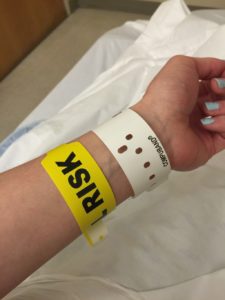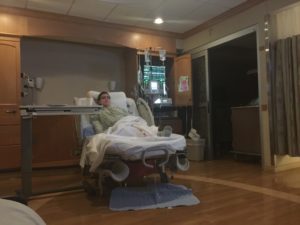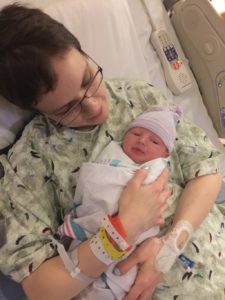Welcome to the next post in our Birth Stories series. We’ll post a new birth story each Monday throughout August and September. Be sure to check back each week for a new story!

My labor started when my water broke at 36 weeks, well before I was ready. I thought I’d wet my pants and held onto this belief until I went to the bathroom. There, I couldn’t control the amount of fluid leaking out of me, even after emptying my bladder. My husband had no idea what happened until I called for him, voice shaking.
“I have a problem. I think I wet my pants.”
“I don’t think you did,” was his reply. “Do you want your phone?”
“And dry pants,” I agreed.
The nurse told me to go to L&D so we left as soon as I was in dry clothes, both of us in complete disbelief. The drive to the hospital was calm and quick; nobody was on the highway at midnight. I was in denial about what was happening until I climbed out of the car and realized that even with the overnight pad I was wearing, my pants were soaked. By the time we made it to triage, I could no longer deny it: they were going to admit me.
I was handed a hospital gown by the nurses at triage, who wrapped monitors around my belly and left to check on other mothers who came in ahead of me. For 10 minutes it was just me and my son’s heartbeat: a now-familiar rhythmic whoosh. When they checked my dilation, I was asked if I could feel the contractions happening every four minutes. I couldn’t. They called my doctor. The baby was high and I was barely dilated.
They didn’t think my contractions were strong enough to help me progress and they didn’t know why my water broke so early. They told me they wanted to induce stronger labor contractions with Pitocin and also that I needed IV antibiotics. I hadn’t been tested for Group B Strep yet. I laughed and told them my appointment for that was supposed to be in seven hours.
When asked if I planned to have an epidural, I firmly said no. I took hypnobirthing classes late in my second trimester in hopes of avoiding an epidural. Not to prove anything, but because the idea of not being able to stand up or walk terrified me. Heart pounding and eyes wide, I looked at my husband and joked with the nurse as we walked to my labor suite. I was nervous and hoped for two things: that everything I’d done over the past 10 weeks to prepare for labor would work and that the baby would be healthy.

We tried to rest as contractions came on with more intensity. They started in my back and surged over and through me, top to bottom. Rather than pain, they felt like pressure, almost like I was being squeezed in a vice. I breathed into the pressure of each one, relaxed into them, and visualized my cervix opening a hair more as each contraction peaked and left. My son’s heart rate thrummed in the background, offering reassurance and something to focus on outside of myself. As the Pitocin was increased and contractions came more frequently, the sound of his heartbeat kept me focused as I sank deeper into labor and lost track of time.
When my nurse returned, she asked if I was warm, snapping me out of my reverie. I wasn’t cold, but my limbs were shaking with adrenaline and it was all I could do to keep my eyes open between contractions, now coming every two minutes. My voice sounded like it was someone else’s when I said I wanted to get into bed, and she wrapped me in warmed blankets to get me there. My husband held my shoulders as I sank, face-first, into a pillow. I’d been up nearly 24 hours. I wanted sleep. I wanted to be on the other side of this. We were told my drips would be left alone; everything looked to be progressing as it should.
Almost as quickly as my nurse left, another appeared, annoying me. Before I could protest, she turned up the Pitocin and left the room. As soon as the door clicked I was hit with a contraction that sucked all breath out of me, followed by another. And another. I felt like I was being sucked under water, dashed into rocks, and lifted up long enough to inhale before another wave hit.
I begged my husband to turn off the Pitocin. I said I couldn’t do it anymore. Let’s go home; we can have a baby another day. I hadn’t asked for an epidural, but when I said I was done, he asked if I wanted to be checked before we asked for anything. Gently, he reminded me that our birth instructor told us multiple times that “I can’t do it anymore” typically meant we didn’t have to, we were almost to the end. I was out of breath and nodded and then, he was gone.
He came back with a nurse, but not my nurse. It was the one I found annoying. She matter-of-factly said everything was exactly as it needed to be, and she didn’t want to check me. She explained they didn’t like checking first-time moms so early in labor. Besides, I couldn’t possibly be close enough to having a baby! I’d only been in the hospital six hours.
Gritting my teeth through a contraction, it dawned on me that I was pushing.
“I’m bearing down. CHECK ME!” My voice came out a growl.
Then I was gone again in another wave of pressure, lower this time. She checked me and then turned white, saying she needed to get someone else. I felt my heart skip a beat. I thought the baby was in trouble. She came back with my nurse, who checked me quickly, and without pausing barked out, “She’s at plus two, that’s the baby’s head. Call her doctor NOW!”
The waves had been transition, and we all had missed the moment the baby descended into the birth canal. I melted down, scared and overwhelmed with emotion.
“I can’t do this! It’s too early!” I sobbed to my husband.
“You can. You ARE. You’re both safe. You can do this!” He urged as I grabbed his hand.
I laughed when the nurse told me that I had to wait for the doctor to come. Catching babies was above her pay grade. I fought pushing for 20 minutes, past when they thought my doctor would come. Unsure if I could wait any longer, they paged the on-call resident, who was followed in by my doctor. My relief was palpable upon seeing her face.
I pushed and pushed. When I felt the baby’s head move, I pushed again, gripping my husband, trying to find the right muscles to use. The baby moved again, lower. They called for a NICU team, just in case it was needed. My doctor told me she didn’t think he would; his heartbeat was strong. I was strong. We both were tolerating labor like a champ.
Another contraction. More pushes. I was tired. This was hard. He was moving so very little. They offered me the mirror and I declined. I wasn’t sure if it would help. Later, when my husband told me how awesome it was to see our son being born, I wished I’d said yes.
I could feel his head crowning but couldn’t figure out how to get him out. My curiosity got the best of me. Reaching down, I felt a head full of hair. Shocked, I asked if that was the baby.
“Yes! That’s your baby! Let’s get him out.”
One push later and his head came out with a pop like a champagne cork. Shoulders came next and then  he was on my chest, purple and screaming. Thirty minutes after I started pushing I was holding my perfect little boy. My baby.
he was on my chest, purple and screaming. Thirty minutes after I started pushing I was holding my perfect little boy. My baby.
“Hello! Hello! You’re here!” I said, not sure what else to say. “Look what we made!” I grinned up at my husband. He cut the cord and the NICU team was sent away: he was healthy.
For an hour he snuggled into me, eyes dark, hair damp. I breathed in his scent. I couldn’t believe he was here and my heart swelled as he squeaked in my arms. When my husband held him, I felt like the luckiest woman alive. A proud dada, a healthy baby, a happy mama.
We made it to the other side with a baby, and it was one of the happiest mornings of my life.













